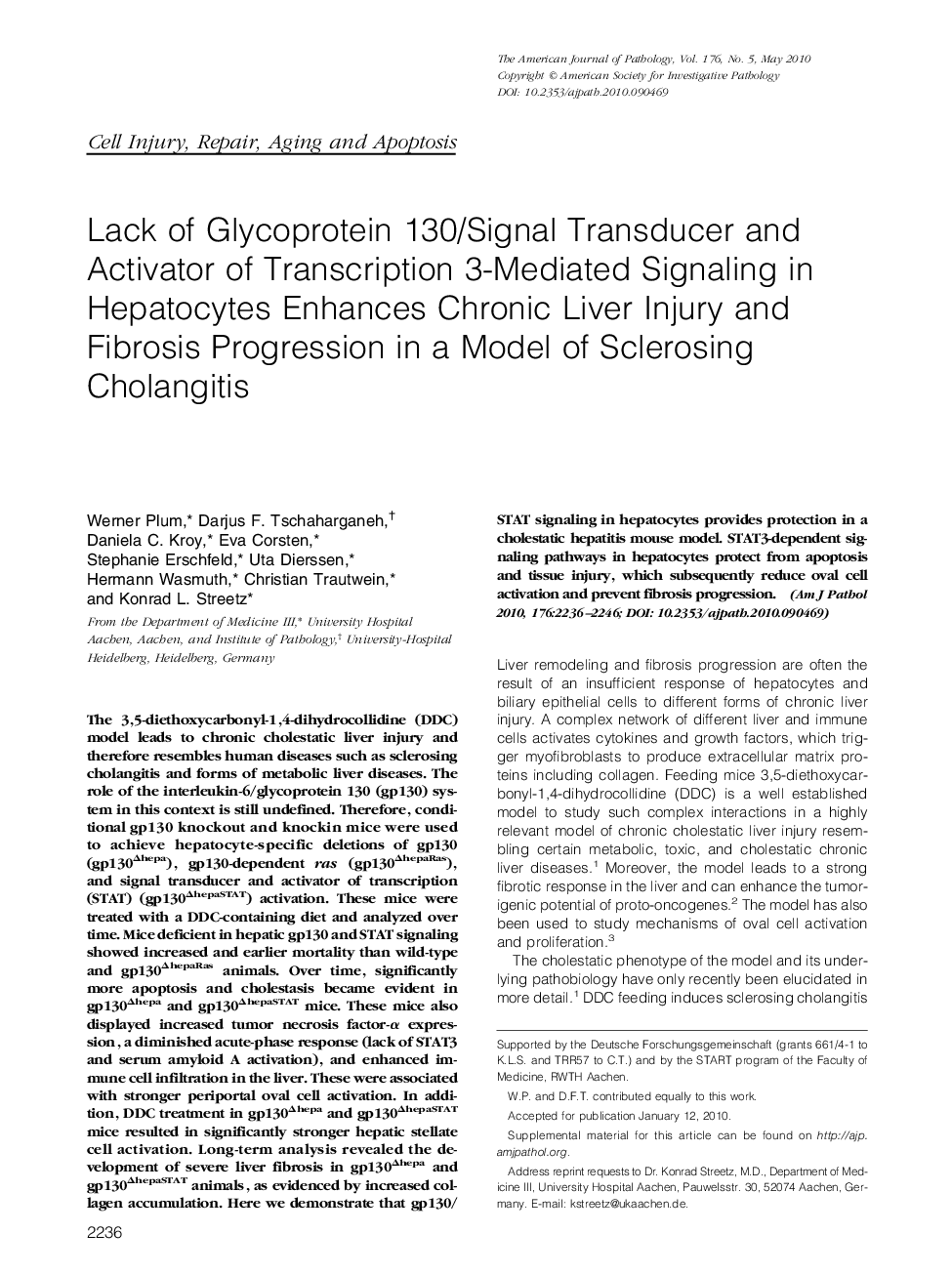| کد مقاله | کد نشریه | سال انتشار | مقاله انگلیسی | نسخه تمام متن |
|---|---|---|---|---|
| 5935689 | 1573442 | 2010 | 11 صفحه PDF | دانلود رایگان |
عنوان انگلیسی مقاله ISI
Lack of Glycoprotein 130/Signal Transducer and Activator of Transcription 3-Mediated Signaling in Hepatocytes Enhances Chronic Liver Injury and Fibrosis Progression in a Model of Sclerosing Cholangitis
دانلود مقاله + سفارش ترجمه
دانلود مقاله ISI انگلیسی
رایگان برای ایرانیان
موضوعات مرتبط
علوم پزشکی و سلامت
پزشکی و دندانپزشکی
کاردیولوژی و پزشکی قلب و عروق
پیش نمایش صفحه اول مقاله

چکیده انگلیسی
The 3,5-diethoxycarbonyl-1,4-dihydrocollidine (DDC) model leads to chronic cholestatic liver injury and therefore resembles human diseases such as sclerosing cholangitis and forms of metabolic liver diseases. The role of the interleukin-6/glycoprotein 130 (gp130) system in this context is still undefined. Therefore, conditional gp130 knockout and knockin mice were used to achieve hepatocyte-specific deletions of gp130 (gp130Îhepa), gp130-dependent ras (gp130ÎhepaRas), and signal transducer and activator of transcription (STAT) (gp130ÎhepaSTAT) activation. These mice were treated with a DDC-containing diet and analyzed over time. Mice deficient in hepatic gp130 and STAT signaling showed increased and earlier mortality than wild-type and gp130ÎhepaRas animals. Over time, significantly more apoptosis and cholestasis became evident in gp130Îhepa and gp130ÎhepaSTAT mice. These mice also displayed increased tumor necrosis factor-α expression, a diminished acute-phase response (lack of STAT3 and serum amyloid A activation), and enhanced immune cell infiltration in the liver. These were associated with stronger periportal oval cell activation. In addition, DDC treatment in gp130Îhepa and gp130ÎhepaSTAT mice resulted in significantly stronger hepatic stellate cell activation. Long-term analysis revealed the development of severe liver fibrosis in gp130Îhepa and gp130ÎhepaSTAT animals, as evidenced by increased collagen accumulation. Here we demonstrate that gp130/STAT signaling in hepatocytes provides protection in a cholestatic hepatitis mouse model. STAT3-dependent signaling pathways in hepatocytes protect from apoptosis and tissue injury, which subsequently reduce oval cell activation and prevent fibrosis progression.
ناشر
Database: Elsevier - ScienceDirect (ساینس دایرکت)
Journal: The American Journal of Pathology - Volume 176, Issue 5, May 2010, Pages 2236-2246
Journal: The American Journal of Pathology - Volume 176, Issue 5, May 2010, Pages 2236-2246
نویسندگان
Werner Plum, Darjus F. Tschaharganeh, Daniela C. Kroy, Eva Corsten, Stephanie Erschfeld, Uta Dierssen, Hermann Wasmuth, Christian Trautwein, Konrad L. Streetz,